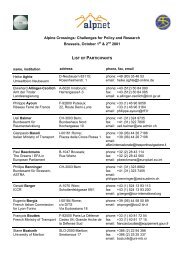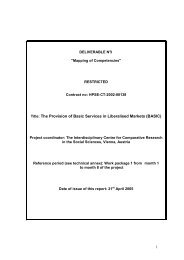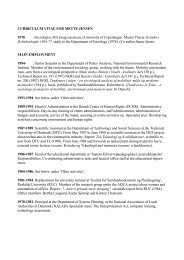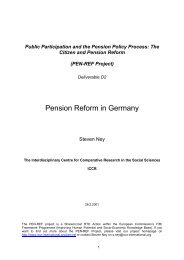The Housing Dimension of Welfare Reform - the ICCR
The Housing Dimension of Welfare Reform - the ICCR
The Housing Dimension of Welfare Reform - the ICCR
Create successful ePaper yourself
Turn your PDF publications into a flip-book with our unique Google optimized e-Paper software.
isolation and lack <strong>of</strong> social networks among persons at risk <strong>of</strong><br />
homelessness or already homeless.<br />
Overcoming social isolation is an important element <strong>of</strong> re-integration<br />
also at a different level, namely that <strong>of</strong> run-down social estates <strong>of</strong> urban<br />
settlements. Encouraging networks and <strong>the</strong> building <strong>of</strong> social ties and<br />
social capital is a central element <strong>of</strong> urban regeneration schemes and<br />
social housing programmes.<br />
Relativise success<br />
<strong>The</strong> success <strong>of</strong> social services or programmes entailing a housing<br />
element cannot be measured as a dichotomous variable and social<br />
integration turns out to be itself a relative measure, especially ins<strong>of</strong>ar as<br />
marginalized persons or persons in need are concerned. Between 50 to 60<br />
per cent <strong>of</strong> clients <strong>of</strong> social services / programmes are successfully reintegrated<br />
ins<strong>of</strong>ar as <strong>the</strong>y are able within a certain period <strong>of</strong> time to lead<br />
independent lives, including covering <strong>the</strong>mselves for <strong>the</strong> costs <strong>of</strong> <strong>the</strong>ir<br />
housing. About every second client <strong>of</strong> such programmes does not achieve<br />
this full form <strong>of</strong> social integration within a year and continues to be in<br />
need <strong>of</strong> support, some for a longer period <strong>of</strong> time or for ever. Those<br />
requiring extensive or continuous social support are usually persons who<br />
additionally face health problems or a serious form <strong>of</strong> addiction<br />
(alcoholism or drugs) or whose family situation restrains <strong>the</strong>m from<br />
becoming fully integrated into <strong>the</strong> labour market (for instance, single<br />
mo<strong>the</strong>rs).<br />
In <strong>the</strong> process <strong>of</strong> rehousing and reintegration, failures and relapses are, in<br />
o<strong>the</strong>r words, not unusual. Clients should always have <strong>the</strong> chance to try<br />
again. Positive outcomes <strong>of</strong> second and third rehousing efforts show that<br />
it is useful for rehousing services to have a fluid settlement plan that<br />
allows clients to ‘fail and return’.<br />
Quality assurance<br />
<strong>The</strong>re are several strategies towards quality assurance. Business-oriented<br />
strategies involve <strong>the</strong> awarding <strong>of</strong> quality awards to social services or <strong>the</strong><br />
contracting out <strong>of</strong> social public services to <strong>the</strong> non-governmental sector.<br />
<strong>The</strong> latter is <strong>of</strong>ten associated with expectations about <strong>the</strong> better<br />
monitoring <strong>of</strong> progress and quality assurance. Ano<strong>the</strong>r widespread<br />
method is <strong>the</strong> publication <strong>of</strong> citizens’ charters with information about<br />
what can be expected <strong>of</strong> social services and standards <strong>of</strong> service delivery.<br />
Most widespread in <strong>the</strong> social service sector are evaluation and quality<br />
control frameworks developed by <strong>the</strong> organisations <strong>the</strong>mselves. <strong>The</strong>se<br />
are mostly elaborated in an informal way, over time and on <strong>the</strong> basis <strong>of</strong><br />
EUROHOME-IMPACT FINAL REPORT 57









